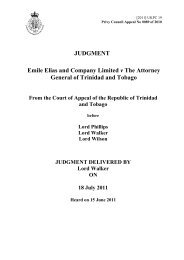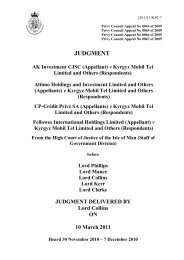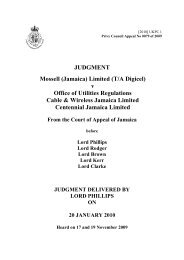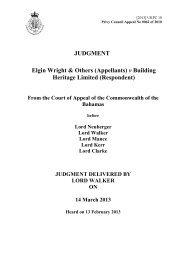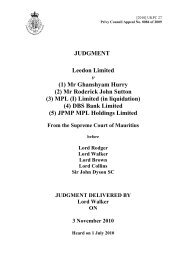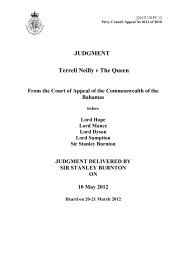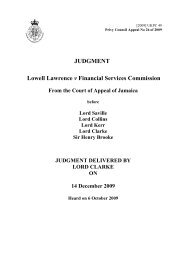Nadine Rodriguez v (1) Minister of Housing of the Government (2 ...
Nadine Rodriguez v (1) Minister of Housing of the Government (2 ...
Nadine Rodriguez v (1) Minister of Housing of the Government (2 ...
Create successful ePaper yourself
Turn your PDF publications into a flip-book with our unique Google optimized e-Paper software.
[2009] UKPC 52<br />
Privy Council Appeal No 0028 <strong>of</strong> 2009<br />
JUDGMENT<br />
<strong>Nadine</strong> <strong>Rodriguez</strong> v (1) <strong>Minister</strong> <strong>of</strong> <strong>Housing</strong> <strong>of</strong> <strong>the</strong><br />
<strong>Government</strong> (2) The <strong>Housing</strong> Allocation Committee<br />
From <strong>the</strong> Court <strong>of</strong> Appeal <strong>of</strong> Gibraltar<br />
before<br />
Lord Phillips<br />
Lady Hale<br />
Lord Collins<br />
Sir Jonathan Parker<br />
Sir Henry Brooke<br />
JUDGMENT DELIVERED BY<br />
LADY HALE<br />
ON<br />
14 December 2009<br />
Heard on 21 October 2009
Appellant<br />
Rabinder Singh QC<br />
Karon Monaghan QC<br />
Pr<strong>of</strong>essor Aileen<br />
McColgan<br />
John Restano<br />
(Instructed by Myers,<br />
Fletcher & Gordon)<br />
Respondent<br />
James Neish QC<br />
Michael Llamas<br />
(Instructed by Penningtons<br />
Solicitors LLP )
LADY HALE<br />
1. Gibraltar is a small place and affordable housing is in short supply. At issue are<br />
<strong>the</strong> policies <strong>of</strong> <strong>the</strong> <strong>Housing</strong> Allocation Committee, <strong>the</strong> statutory body which is<br />
responsible for <strong>the</strong> allocation <strong>of</strong> <strong>Government</strong> housing. Their policy is to grant joint<br />
tenancies to couples only if <strong>the</strong>y are married to one ano<strong>the</strong>r or have a child in<br />
common. This inevitably excludes same sex couples who can nei<strong>the</strong>r marry nor have<br />
children toge<strong>the</strong>r. Is such a difference in treatment unconstitutional?<br />
The history<br />
2. The appellant is <strong>the</strong> tenant <strong>of</strong> a modest <strong>Government</strong> flat. She lives <strong>the</strong>re with<br />
her same sex partner. They have been in a relationship toge<strong>the</strong>r for 21 years. It is a<br />
loving, monogamous, permanent, sexually intimate and financially inter dependent<br />
relationship. The appellant is <strong>the</strong> home maker and her partner is <strong>the</strong> bread winner.<br />
They are unable to marry or enter into a civil partnership in Gibraltar and do not<br />
satisfy <strong>the</strong> residence requirements ei<strong>the</strong>r to enter a civil partnership in <strong>the</strong> United<br />
Kingdom or to marry in Spain. If <strong>the</strong>y were married, <strong>the</strong> appellant’s partner would<br />
have a statutory right to be granted a new tenancy <strong>of</strong> <strong>the</strong> flat when <strong>the</strong> appellant tenant<br />
died, under <strong>the</strong> successor to section 12 <strong>of</strong> <strong>the</strong> <strong>Housing</strong> (Special Powers) Act 1972,<br />
which was <strong>the</strong> legislation in force at <strong>the</strong> time <strong>of</strong> <strong>the</strong>se events. To provide her partner<br />
with long term security in <strong>the</strong> event <strong>of</strong> her death, <strong>the</strong> appellant applied to <strong>the</strong><br />
Committee in October 2006 for <strong>the</strong>m to be granted a joint tenancy.<br />
3. In February 2007, <strong>the</strong> Committee refused that application, although <strong>the</strong>y were<br />
prepared to accept an application from <strong>the</strong> appellant’s partner for separate<br />
accommodation in her own name. The reason <strong>the</strong>y eventually gave in March 2007 was<br />
that “only parents, spouses or children may be included”. The position was later<br />
explained in more detail in <strong>the</strong> witness statement <strong>of</strong> Dr Ron Coram, <strong>the</strong> Principal<br />
<strong>Housing</strong> Officer <strong>of</strong> <strong>the</strong> Ministry <strong>of</strong> <strong>Housing</strong>:<br />
“Applications for joint tenancies are generally approved if <strong>the</strong> application is<br />
made by a married partner, parent, adult child or common law partner <strong>of</strong> <strong>the</strong><br />
tenant. The protection <strong>of</strong> <strong>the</strong> family and in particular children is considered <strong>of</strong><br />
prime importance. . . In <strong>the</strong> case <strong>of</strong> common law partners approval is only<br />
granted if <strong>the</strong> common law partner <strong>of</strong> <strong>the</strong> tenant and <strong>the</strong> tenant have at least one<br />
minor child in common living with <strong>the</strong>m . . . The reason for granting joint<br />
tenancies to common law partners with children in common is to protect <strong>the</strong><br />
-2-
interests <strong>of</strong> <strong>the</strong> children by providing each <strong>of</strong> <strong>the</strong> parents with equal tenancy<br />
rights and in <strong>the</strong> spirit <strong>of</strong> protection <strong>of</strong> <strong>the</strong> family. . . .Similar applications by<br />
common law heterosexual partners who do not have children in common are<br />
not favourably considered.”<br />
The appellant’s request was refused on <strong>the</strong> basis <strong>of</strong> that policy and “in <strong>the</strong> absence <strong>of</strong><br />
any circumstance which would warrant departure from that policy”.<br />
4. She applied to <strong>the</strong> Supreme Court <strong>of</strong> Gibraltar for a declaration that <strong>the</strong> refusal<br />
to grant a joint tenancy was unlawful on four grounds: first, discrimination, contrary<br />
to sections 1 and 14 <strong>of</strong> <strong>the</strong> Constitution and/or <strong>the</strong> common law principle <strong>of</strong> equality;<br />
second, unjustified interference with <strong>the</strong> privacy <strong>of</strong> <strong>the</strong> home, contrary to section 7 <strong>of</strong><br />
<strong>the</strong> Constitution; third, fettering <strong>the</strong> Committee’s discretion; and fourth, <strong>the</strong><br />
inadequacy <strong>of</strong> <strong>the</strong> Committee’s reasons. In December 2008, Dudley J found that <strong>the</strong>re<br />
was no discrimination: <strong>the</strong> proper comparator was not a married couple but an<br />
unmarried opposite sex couple and viewed from that perspective <strong>the</strong> Committee had<br />
not discriminated on <strong>the</strong> basis <strong>of</strong> sexual orientation. However he quashed <strong>the</strong> decision<br />
on <strong>the</strong> ground that <strong>the</strong> <strong>Housing</strong> Allocation Committee had unlawfully fettered <strong>the</strong>ir<br />
discretion. The Committee promptly reconsidered <strong>the</strong>ir decision, but concluded in<br />
February 2009 that “<strong>the</strong>y must abide by departmental policies”.<br />
5. The appellant’s appeal to <strong>the</strong> Court <strong>of</strong> Appeal was heard shortly after this and<br />
judgment given in April 2009. By a majority, <strong>the</strong> appeal was dismissed. After<br />
reviewing <strong>the</strong> authorities at some length, Sir Paul Kennedy concluded that <strong>the</strong> policy<br />
“did not discriminate against <strong>the</strong> appellant, because <strong>the</strong> preference which it gave to<br />
married couples was a positive preference <strong>of</strong> a kind which <strong>the</strong> law regards as<br />
acceptable in circumstances such as <strong>the</strong>se, and which did not require fur<strong>the</strong>r<br />
justification”. Sir Murray Stuart-Smith delivered a short concurring judgment and Sir<br />
William Aldous dissented.<br />
The Constitution<br />
6. Section 1 <strong>of</strong> <strong>the</strong> Constitution <strong>of</strong> Gibraltar (Annex 1 to <strong>the</strong> Gibraltar<br />
Constitution Order 2006) is declaratory and explanatory:<br />
“It is hereby recognised and declared that in Gibraltar <strong>the</strong>re have existed and<br />
shall continue to exist without discrimination by reason <strong>of</strong> any ground referred<br />
to in section 14(3), but subject to respect for <strong>the</strong> rights and freedoms <strong>of</strong> o<strong>the</strong>rs<br />
-3-
and for <strong>the</strong> public interest, each and all <strong>of</strong> <strong>the</strong> following human rights and<br />
fundamental freedoms, namely –<br />
(a) <strong>the</strong> right <strong>of</strong> <strong>the</strong> individual to life, liberty, security <strong>of</strong> <strong>the</strong> person, <strong>the</strong><br />
enjoyment <strong>of</strong> property and <strong>the</strong> protection <strong>of</strong> <strong>the</strong> law;<br />
(b) freedom <strong>of</strong> conscience, <strong>of</strong> expression, <strong>of</strong> assembly, <strong>of</strong> association<br />
and freedom to establish schools; and<br />
(c) <strong>the</strong> right <strong>of</strong> <strong>the</strong> individual to protection for his personal privacy, for<br />
<strong>the</strong> privacy <strong>of</strong> his home and o<strong>the</strong>r property and from deprivation <strong>of</strong><br />
property without adequate compensation,<br />
and <strong>the</strong> provisions <strong>of</strong> this Chapter shall have effect for <strong>the</strong> purpose <strong>of</strong> affording<br />
protection to <strong>the</strong> said rights and freedoms subject to such limitations <strong>of</strong> that<br />
protection as are contained in those provisions, being limitations designed to<br />
ensure that <strong>the</strong> enjoyment <strong>of</strong> <strong>the</strong> said rights and freedoms by any individual<br />
does not prejudice <strong>the</strong> rights and freedoms <strong>of</strong> o<strong>the</strong>rs or <strong>the</strong> public interest.”<br />
It would appear, <strong>the</strong>refore, although nothing turns upon <strong>the</strong> point in this case, that <strong>the</strong><br />
substance <strong>of</strong> <strong>the</strong> rights <strong>the</strong>re listed is protected, not by section 1, but by <strong>the</strong> later<br />
sections which spell <strong>the</strong>m and <strong>the</strong>ir limitations out in more detail. Section 1 does<br />
however insist that <strong>the</strong>y exist without discrimination on <strong>the</strong> prohibited grounds.<br />
7. Section 7 deals with protection for privacy <strong>of</strong> home and o<strong>the</strong>r property, “home”<br />
clearly having an expansive meaning in this context. The effect is very similar to<br />
article 8 <strong>of</strong> <strong>the</strong> European Convention on Human Rights (ECHR), save that <strong>the</strong> list <strong>of</strong><br />
legitimate aims is longer and <strong>the</strong> burden <strong>of</strong> proving that a law or act done under a law<br />
is not “reasonably justifiable in a democratic society” lies upon <strong>the</strong> person claiming<br />
that her rights have been violated. The material provisions for our purposes are:<br />
“(1) Every person has <strong>the</strong> right to respect for his private and family life, his<br />
home and his correspondence. …<br />
(3) Nothing contained in or done under <strong>the</strong> authority <strong>of</strong> any law shall be held to<br />
be inconsistent with or in contravention <strong>of</strong> this section to <strong>the</strong> extent that <strong>the</strong> law<br />
in question makes provision –<br />
(a) in <strong>the</strong> interests <strong>of</strong> defence, <strong>the</strong> economic well-being <strong>of</strong> Gibraltar,<br />
public safety, public order, public morality, public health, town<br />
planning, <strong>the</strong> development or utilisation <strong>of</strong> mineral resources, or <strong>the</strong><br />
development or utilisation <strong>of</strong> any o<strong>the</strong>r property in such a manner as to<br />
promote <strong>the</strong> public benefit; . . .<br />
-4-
except so far as that provision or, as <strong>the</strong> case may be, <strong>the</strong> thing done under <strong>the</strong><br />
authority <strong>the</strong>re<strong>of</strong> is shown not to be reasonably justifiable in a democratic<br />
society.”<br />
Section 1, <strong>of</strong> course, has already provided that <strong>the</strong> right to protection for <strong>the</strong> privacy <strong>of</strong><br />
<strong>the</strong> home, exists without discrimination on any ground referred to in section 14(3).<br />
8. Section 14 deals with protection from discrimination on prohibited grounds:<br />
“(1) Subject to subsections (4), (5) and (7), no law shall make any provision<br />
that is discriminatory ei<strong>the</strong>r <strong>of</strong> itself or in its effect.<br />
(2) Subject to subsections (6), (7) and (8), no person shall be treated in a<br />
discriminatory manner by any person acting in <strong>the</strong> performance <strong>of</strong> any public<br />
function conferred by any law or o<strong>the</strong>rwise in <strong>the</strong> performance <strong>of</strong> <strong>the</strong> functions<br />
<strong>of</strong> any public <strong>of</strong>fice or any public authority.<br />
(3) In this section, <strong>the</strong> expression ‘discriminatory’ means affording different<br />
treatment to different persons attributable wholly or mainly to <strong>the</strong>ir respective<br />
descriptions by race, caste, place <strong>of</strong> or social origin, political or o<strong>the</strong>r opinions<br />
or affiliations, colour, language, sex, creed, property, birth or o<strong>the</strong>r status, or<br />
such o<strong>the</strong>r grounds as <strong>the</strong> European Court <strong>of</strong> Human Rights may, from time to<br />
time, determine to be discriminatory, whereby persons <strong>of</strong> one such description<br />
are subjected to disabilities or restrictions to which persons <strong>of</strong> ano<strong>the</strong>r such<br />
description are not made subject or are accorded privileges or advantages that<br />
are not accorded to persons <strong>of</strong> ano<strong>the</strong>r such description.”<br />
9. Most <strong>of</strong> <strong>the</strong> exceptions set out in subsections (4) and (5) are not relevant to this<br />
case. However subsection (4) might be relevant:<br />
“(4) Subsection (1) shall not apply to any law so far as that law makes<br />
provision – . . .<br />
(e) whereby persons <strong>of</strong> any such description as is mentioned in<br />
subsection (3) may be subjected to any disability or restriction or may be<br />
accorded any privilege or advantage that, having regard to its nature and<br />
to special circumstances pertaining to those persons or to persons <strong>of</strong> any<br />
o<strong>the</strong>r such description, is consistent with <strong>the</strong> provisions <strong>of</strong> <strong>the</strong> European<br />
Convention on Human Rights.”<br />
-5-
10. Subsection (6) provides that subsection (2) shall not apply to anything<br />
expressly or by necessary implication authorised to be done by laws which are<br />
excepted from subsection (1) by subsections (4) or (5). Subsection (7) is relevant to<br />
our case:<br />
“(7) Nothing contained in or done under <strong>the</strong> authority <strong>of</strong> any law shall be held<br />
to be inconsistent with or in contravention <strong>of</strong> this section to <strong>the</strong> extent that <strong>the</strong><br />
law in question makes provision whereby persons <strong>of</strong> any such description as is<br />
mentioned in subsection (3) may be subjected to any restriction on <strong>the</strong> rights<br />
and freedoms guaranteed by sections 7 . . . , being such a restriction as is<br />
authorised by section 7(3) . . . ”<br />
11. These provisions do not enjoy <strong>the</strong> clarity and simplicity <strong>of</strong> <strong>the</strong> equivalent<br />
provisions in <strong>the</strong> ECHR. No doubt <strong>the</strong>re are very good reasons for this. But <strong>the</strong>re are<br />
at least two good reasons for thinking that <strong>the</strong>y are intended to provide at least a<br />
similar level <strong>of</strong> protection as is provided under <strong>the</strong> ECHR. The first is that <strong>the</strong> United<br />
Kingdom extended <strong>the</strong> protection <strong>of</strong> <strong>the</strong> ECHR to Gibraltar (by declaration <strong>of</strong> 23<br />
October 1953), so that it would be surprising if Gibraltarians were to enjoy a lesser<br />
level <strong>of</strong> protection for <strong>the</strong>ir fundamental human rights under <strong>the</strong>ir Constitution than<br />
<strong>the</strong>y do under <strong>the</strong> ECHR. The second is that <strong>the</strong> Constitution refers to <strong>the</strong> ECHR in<br />
several places. These include section 18(8)(a), which provides that a “court or tribunal<br />
determining a question which has arisen in connection with a right or limitation<br />
<strong>the</strong>re<strong>of</strong> set out in this Chapter must take into account” <strong>the</strong> jurisprudence <strong>of</strong> <strong>the</strong><br />
European Court and Commission <strong>of</strong> Human Rights and <strong>the</strong> decisions <strong>of</strong> <strong>the</strong><br />
Committee <strong>of</strong> <strong>Minister</strong>s “whenever made or given, so far as, in <strong>the</strong> opinion <strong>of</strong> <strong>the</strong><br />
court or tribunal, it is relevant to <strong>the</strong> proceedings in which that question has arisen”.<br />
However, <strong>the</strong> Board is interpreting <strong>the</strong> Constitution <strong>of</strong> Gibraltar, not <strong>the</strong> ECHR, so<br />
that <strong>the</strong> reasons for restraint in <strong>the</strong> interpretation <strong>of</strong> <strong>the</strong> “convention rights” under <strong>the</strong><br />
United Kingdom’s Human Rights Act 1998 does not apply: cf R (Ullah) v Special<br />
Adjudicator [2004] UKHL 26, [2004] 2 AC 323, para 20. It is now common ground<br />
that in at least one respect <strong>the</strong> Constitution goes fur<strong>the</strong>r than <strong>the</strong> ECHR.<br />
12. The parties are agreed on two points. First, it is not in dispute that sexual<br />
orientation is now among <strong>the</strong> grounds found to be discriminatory by <strong>the</strong> European<br />
Court <strong>of</strong> Human Rights (see Salgueiro da Silva Mouta v Portugal (1999) 31 EHRR<br />
1055) and is thus included in <strong>the</strong> list <strong>of</strong> prohibited grounds in section 14(3). Second, it<br />
is not now in dispute that section 14(2) provides a free-standing protection from<br />
discriminatory treatment. Unlike article 14 <strong>of</strong> <strong>the</strong> ECHR, it is not limited to<br />
discrimination in “<strong>the</strong> enjoyment <strong>of</strong> <strong>the</strong> rights and freedoms set forth” in <strong>the</strong> ECHR.<br />
Dudley J was inclined to this view in <strong>the</strong> Supreme Court <strong>of</strong> Gibraltar, as was <strong>the</strong> Privy<br />
Council in <strong>the</strong> case <strong>of</strong> Cerisola v HM Attorney General for Gibraltar [2008] UKPC<br />
18, [2008] 5 LRC 111, at paras 35, 36. Mr James Neish QC, who appears for <strong>the</strong><br />
-6-
13. The parties are also agreed on three o<strong>the</strong>r points, although <strong>the</strong>se do not emerge<br />
as clearly from <strong>the</strong> wording <strong>of</strong> section 14. Both have proceeded on <strong>the</strong> basis that <strong>the</strong>re<br />
must be read into section 14(3) <strong>the</strong> now well-established approach <strong>of</strong> <strong>the</strong> European<br />
Court <strong>of</strong> Human Rights to <strong>the</strong> prohibition <strong>of</strong> discrimination under article 14 <strong>of</strong> <strong>the</strong><br />
ECHR. A recent statement <strong>of</strong> long-established principles appears in Korelc v Slovenia<br />
(Application No 28456/03) (unreported) 12 May 2009, para 83:<br />
“<strong>the</strong> Court reiterates that according to its established case law discrimination<br />
means treating differently, without an objective and reasonable justification,<br />
persons in relevantly similar situations. . . Such a difference <strong>of</strong> treatment is<br />
discriminatory if it has no objective and reasonable justification; in o<strong>the</strong>r<br />
words, if it does not pursue a legitimate aim or if <strong>the</strong>re is not a reasonable<br />
relationship <strong>of</strong> proportionality between <strong>the</strong> means employed and <strong>the</strong> aim sought<br />
to be realised.”<br />
14. To this Mr Singh QC on behalf <strong>of</strong> <strong>the</strong> appellant would add, and <strong>the</strong> Board does<br />
not understand Mr Neish to disagree, <strong>the</strong> well-known principle from Thlimmenos v<br />
Greece (2000) 31 EHRR 411, para 44:<br />
“The right not to be discriminated against . . . is also violated when states<br />
without an objective and reasonable justification fail to treat differently persons<br />
whose situations are significantly different.”<br />
In o<strong>the</strong>r words, just as like cases must be treated alike, unlike cases must be treated<br />
differently.<br />
15. Mr Singh also drew our attention to <strong>the</strong> unequivocal acceptance by <strong>the</strong><br />
European Court <strong>of</strong> Human Rights <strong>of</strong> <strong>the</strong> principle <strong>of</strong> indirect discrimination in <strong>the</strong><br />
recent case <strong>of</strong> DH v Czech Republic (2007) 47 EHRR 59, para 194: “Where it has<br />
been shown that legislation produces such a discriminatory effect . . . it is not<br />
necessary . . . to prove any discriminatory intent on <strong>the</strong> part <strong>of</strong> <strong>the</strong> relevant<br />
authorities”. Again, Mr Neish does not disagree. Section 14(1) <strong>of</strong> <strong>the</strong> Constitution<br />
expressly covers a law which is discriminatory ei<strong>the</strong>r “<strong>of</strong> itself” or “in its effect”. It<br />
would be surprising if section 14(2) did not also cover treatment by public <strong>of</strong>ficials<br />
which is discriminatory ei<strong>the</strong>r <strong>of</strong> itself or in its effect.<br />
-7-
16. The parties are not agreed on two points. First, has <strong>the</strong>re been discriminatory<br />
treatment at all? Second, if <strong>the</strong>re has, can such discriminatory treatment be justified?<br />
Discriminatory treatment<br />
17. The simple proposition that like cases must be treated alike (and that unlike<br />
cases must be treated differently) begs <strong>the</strong> inevitable question. How do we identify<br />
which cases are alike and which are unlike? When are people in a relevantly similar<br />
situation? There are times when <strong>the</strong> European Court <strong>of</strong> Human Rights surmounts this<br />
hurdle with ease and o<strong>the</strong>r times when it does not. Thus in <strong>the</strong> recent case <strong>of</strong> Burden v<br />
United Kingdom (2008) 47 EHRR 857, <strong>the</strong> majority <strong>of</strong> <strong>the</strong> Grand Chamber held that<br />
two sisters living toge<strong>the</strong>r were not in an analogous situation to civil partners because<br />
marriage and civil partnership were different forms <strong>of</strong> relationship from siblingship.<br />
The problem with that analysis is that <strong>the</strong> ground for <strong>the</strong> difference in treatment, <strong>the</strong><br />
lack <strong>of</strong> marital or civil partnership status, is also <strong>the</strong> reason why <strong>the</strong> person treated<br />
differently is said not to be in an analogous situation. This can be dangerous. If <strong>the</strong><br />
ground for <strong>the</strong> difference in treatment were a difference in sex, it would not be<br />
permissible to say that a man and a woman are not in an analogous situation because<br />
men and women are different. Hence in Burden, Judge Björgvinsson said that <strong>the</strong><br />
comparison should focus, not on <strong>the</strong> differences in legal framework, but on <strong>the</strong><br />
differences in <strong>the</strong> nature <strong>of</strong> <strong>the</strong> relationship as such. He and Judge Bratza concluded<br />
that <strong>the</strong> difference in treatment was justified.<br />
18. The Board considers that <strong>the</strong> same result would be reached in all <strong>the</strong>se cases,<br />
whatever <strong>the</strong> route taken, but in construing <strong>the</strong> Constitution <strong>of</strong> Gibraltar it prefers <strong>the</strong><br />
approach <strong>of</strong> Judges Björgvinsson and Bratza. It would be unfortunate if discrimination<br />
in constitutional and human rights law were to get bogged down in <strong>the</strong> problems <strong>of</strong><br />
identifying <strong>the</strong> proper comparator which have so bedevilled domestic antidiscrimination<br />
law in <strong>the</strong> United Kingdom. There is no need for it to do so, because in<br />
constitutional and human rights law both direct and indirect discrimination can be<br />
justified, whereas in our domestic anti-discrimination law direct discrimination can<br />
never be justified. In R (Carson) v Secretary <strong>of</strong> State for Work and Pensions [2005]<br />
UKHL 37, [2006] 1 AC 173, at para 3, Lord Nicholls <strong>of</strong> Birkenhead preferred to keep<br />
<strong>the</strong> formulation <strong>of</strong> <strong>the</strong> relevant issues under article 14 as simple and non-technical as<br />
possible:<br />
“<strong>the</strong> essential question for <strong>the</strong> court is whe<strong>the</strong>r <strong>the</strong> alleged discrimination, that<br />
is, <strong>the</strong> difference in treatment <strong>of</strong> which complaint is made, can withstand<br />
scrutiny. Sometimes <strong>the</strong> answer to this question will be plain. There may be<br />
such an obvious, relevant difference between <strong>the</strong> claimant and those with<br />
whom he seeks to compare himself that <strong>the</strong>ir situations cannot be regarded as<br />
-8-
analogous. Sometimes, where <strong>the</strong> position is not so clear, a different approach<br />
is called for. Then <strong>the</strong> court’s scrutiny may best be directed at considering<br />
whe<strong>the</strong>r <strong>the</strong> differentiation has a legitimate aim and whe<strong>the</strong>r <strong>the</strong> means chosen<br />
to achieve <strong>the</strong> aim is appropriate and not disproportionate in its adverse<br />
impact.”<br />
19. In this case we have a clear difference in treatment but not such an obvious<br />
difference between <strong>the</strong> appellant and o<strong>the</strong>rs with whom she seeks to compare herself.<br />
The appellant and her partner have been denied a joint tenancy in circumstances<br />
where o<strong>the</strong>rs would have been granted one. They are all family members living<br />
toge<strong>the</strong>r who wish to preserve <strong>the</strong> security <strong>of</strong> <strong>the</strong>ir homes should one <strong>of</strong> <strong>the</strong>m die. The<br />
difference in treatment is not directly on account <strong>of</strong> <strong>the</strong>ir sexual orientation, because<br />
<strong>the</strong>re are o<strong>the</strong>r unmarried couples who would also be denied a joint tenancy. But even<br />
if, as Dudley J found, <strong>the</strong>se are <strong>the</strong> proper comparator, <strong>the</strong> effect <strong>of</strong> <strong>the</strong> policy upon<br />
this couple is more severe than on <strong>the</strong>m. It is also more severe than in most cases <strong>of</strong><br />
indirect discrimination, where <strong>the</strong> criterion imposed has a disparate impact upon<br />
different groups. In this case, <strong>the</strong> criterion is one which this couple, unlike o<strong>the</strong>r<br />
unmarried couples, will never be able to meet. They will never be able to get married<br />
or to have children in common. And that is because <strong>of</strong> <strong>the</strong>ir sexual orientation. Thus it<br />
is a form <strong>of</strong> indirect discrimination which comes as close as it can to direct<br />
discrimination. Indeed, Mr Singh puts this as a Thlimmenos case: <strong>the</strong>y are being<br />
treated in <strong>the</strong> same way as o<strong>the</strong>r unmarried couples despite <strong>the</strong> fact that <strong>the</strong>y cannot<br />
marry or have children in common. As Ackermann J put it in <strong>the</strong> South African<br />
Constitutional Court decision in National Coalition for Gay and Lesbian Equality v<br />
<strong>Minister</strong> <strong>of</strong> Home Affairs [2000] 4 LRC 292, at para 54, <strong>the</strong> impact <strong>of</strong> this denial<br />
“constitutes a crass, blunt, cruel and serious invasion <strong>of</strong> <strong>the</strong>ir dignity”.<br />
20. Mr Neish seeks to meet this argument by relying on <strong>the</strong> line <strong>of</strong> cases in <strong>the</strong><br />
European Court <strong>of</strong> Human Rights which have upheld special privileges for married<br />
couples (and latterly civil partners). In some <strong>of</strong> <strong>the</strong>se <strong>the</strong> Court has said that married<br />
and unmarried hetero-sexual partners are not in an analogous situation: see in<br />
particular <strong>the</strong> admissibility decisions in Shackell v United Kingdom (Application No<br />
45851/99) (unreported) 27 April 2000, citing Lindsay v United Kingdom (1986) 9<br />
EHRR CD 555, and <strong>the</strong> recent decision in Serife Yigit v Turkey (Application No<br />
3976/05) (unreported) 20 January 2009, privileging civil over religious marriages in<br />
Turkey. In Burden v United Kingdom (2008) 47 EHRR 857, <strong>the</strong> Grand Chamber<br />
observed at para 63:<br />
“In Shackell, <strong>the</strong> Court found that <strong>the</strong> situations <strong>of</strong> married and unmarried<br />
heterosexual cohabiting couples were not analogous for <strong>the</strong> purposes <strong>of</strong><br />
survivors’ benefits, since ‘marriage remains an institution which is widely<br />
-9-
accepted as conferring a particular status on those who enter it’. The Grand<br />
Chamber considers that this view still holds true.”<br />
21. Finally, Mr Neish relies upon <strong>the</strong> admissibility decision in Courten v United<br />
Kingdom (Application No 4479/06) (unreported) 4 November 2008, in which <strong>the</strong><br />
survivor <strong>of</strong> a same sex relationship complained that he had had to pay inheritance tax<br />
upon <strong>the</strong> couple’s home. His partner had died before <strong>the</strong> Civil Partnership Act 2004<br />
came into force and so <strong>the</strong>y were unable to escape that liability by entering into a civil<br />
partnership. The Court relied on Shackell, Lindsay, and Burden, pointing out:<br />
“The Court has had previous occasion to remark that, notwithstanding social<br />
changes, marriage remains an institution that is widely accepted as conferring a<br />
particular status on those who enter it and, indeed, it is singled out for special<br />
treatment under article 12 <strong>of</strong> <strong>the</strong> Convention. It has held, for example, that <strong>the</strong><br />
promotion <strong>of</strong> marriage, by way <strong>of</strong> limited benefits for surviving spouses,<br />
cannot be said to exceed <strong>the</strong> margin <strong>of</strong> appreciation afforded to <strong>the</strong> respondent<br />
<strong>Government</strong>…”<br />
The Court dealt ra<strong>the</strong>r summarily with <strong>the</strong> argument that <strong>the</strong> couple were unable to get<br />
married at <strong>the</strong> relevant time by accepting that <strong>the</strong> United Kingdom could not be<br />
criticised for failing to legislate for civil partnerships earlier than it did. This confirms<br />
<strong>the</strong> prescience <strong>of</strong> <strong>the</strong> majority <strong>of</strong> <strong>the</strong> House <strong>of</strong> Lords in M v Department <strong>of</strong> Work and<br />
Pensions [2006] UKHL 11, [2006] 2 AC 91, who reached <strong>the</strong> same conclusion about<br />
<strong>the</strong> discriminatory treatment <strong>of</strong> same sex couples under <strong>the</strong> child support scheme.<br />
22. Mr Singh rightly points out that all <strong>the</strong>se cases concerned taxation and similar<br />
benefits within <strong>the</strong> ambit <strong>of</strong> article 1 <strong>of</strong> Protocol 1 ra<strong>the</strong>r than within <strong>the</strong> ambit <strong>of</strong><br />
article 8. There is a much wider margin <strong>of</strong> appreciation for Member States in <strong>the</strong><br />
former context than in <strong>the</strong> latter. He also points out that <strong>the</strong> concept <strong>of</strong> a margin <strong>of</strong><br />
appreciation has no relevance to a national court interpreting its own laws. However,<br />
<strong>the</strong> Board would observe that <strong>the</strong> Strasbourg Court’s reliance on <strong>the</strong> margin <strong>of</strong><br />
appreciation suggests that, despite <strong>the</strong> references to married and unmarried couples<br />
not being in an analogous situation, <strong>the</strong> Court was in reality finding that to privilege<br />
marriage in <strong>the</strong> context in question could readily be justified. For <strong>the</strong> reasons given<br />
earlier, <strong>the</strong> Board also considers it more logical to ask whe<strong>the</strong>r distinctions between<br />
married and unmarried couples can be justified than to regard <strong>the</strong> discriminatory status<br />
itself as placing <strong>the</strong>m in different situations.<br />
-10-
23. Hence, applying <strong>the</strong> approach <strong>of</strong> Lord Nicholls in Carson, <strong>the</strong> Board finds that<br />
<strong>the</strong> appellant has been treated in an indirectly discriminatory manner on account <strong>of</strong> her<br />
sexual orientation and turns to <strong>the</strong> question <strong>of</strong> justification.<br />
Justification<br />
24. The Board accepts that <strong>the</strong> ease <strong>of</strong> justification will vary with <strong>the</strong> context. It<br />
will be easier to justify differential fiscal benefits than differential interferences with<br />
<strong>the</strong> home and family life. In both Shackell v United Kingdom and Mata Estevez v<br />
Spain [2001] ECHR 56501/00 (admissibility) 10 May 2001, <strong>the</strong> Court did consider<br />
whe<strong>the</strong>r privileging marriage for fiscal and benefit purposes could be justified and<br />
held that in those cases it could. The Court has also required differences in treatment<br />
between married and unmarried fa<strong>the</strong>rs to be justified: see McMichael v United<br />
Kingdom (1995) 20 EHRR 205, where <strong>the</strong> difference was justified and PM v United<br />
Kingdom (2005) 42 EHRR 1015 and Sommerfeld v Germany (2003) 38 EHRR 756,<br />
where it was not. And in In re G (Adoption: Unmarried Couple) [2008] UKHL 38,<br />
[2009] 1 AC 173, <strong>the</strong> House <strong>of</strong> Lords not only required a difference in treatment<br />
between married and unmarried couples in <strong>the</strong> law <strong>of</strong> adoption to be justified but also<br />
found that it was not: a blanket ban on joint adoption by any unmarried couple<br />
irrespective <strong>of</strong> <strong>the</strong> best interests <strong>of</strong> <strong>the</strong> child was irrational. Indeed, <strong>the</strong> majority took<br />
<strong>the</strong> view that <strong>the</strong> Strasbourg Court would not find this to be within <strong>the</strong> State’s margin<br />
<strong>of</strong> appreciation, relying in particular on EB v France (2008) 47 EHRR 509, where <strong>the</strong><br />
denial <strong>of</strong> adoption to a woman in a same sex relationship could not be justified.<br />
25. The benefit <strong>of</strong> a justification analysis is that it encourages structured thinking.<br />
A legitimate aim <strong>of</strong> <strong>the</strong> difference in treatment must first be identified. There must<br />
<strong>the</strong>n be a rational connection between <strong>the</strong> aim and <strong>the</strong> difference in treatment. And <strong>the</strong><br />
difference must be proportionate to <strong>the</strong> aim.<br />
26. No-one doubts that <strong>the</strong> “protection <strong>of</strong> <strong>the</strong> family in <strong>the</strong> traditional sense” is<br />
capable <strong>of</strong> being a legitimate and weighty aim: see Karner v Austria (2003) 38 EHRR<br />
528, para 40. Privileging marriage can <strong>of</strong> course have <strong>the</strong> legitimate aim <strong>of</strong><br />
encouraging opposite sex couples to enter into <strong>the</strong> status which <strong>the</strong> State considers to<br />
be <strong>the</strong> most appropriate and beneficial legal framework within which to conduct <strong>the</strong>ir<br />
common lives. Privileging civil partnership could have <strong>the</strong> same legitimate aim for<br />
same sex couples. But, to paraphrase Buxton LJ in <strong>the</strong> Court <strong>of</strong> Appeal’s decision in<br />
Ghaidan v Godin-Mendoza [2002] EWCA Civ 1533, [2003] Ch 380, at para 21, it is<br />
difficult to see how heterosexuals will be encouraged to marry by <strong>the</strong> knowledge that<br />
some associated benefit is being denied to homosexuals. They will not be saying to<br />
one ano<strong>the</strong>r “let’s get married because we will get this benefit and our gay friends<br />
won’t”. Moreover, as Baroness Hale said in <strong>the</strong> same case in <strong>the</strong> House <strong>of</strong> Lords<br />
[2004] UKHL 30, [2004] 2 AC 557, at para 143:<br />
-11-
“The distinction between heterosexual and homosexual couples might be aimed<br />
at discouraging homosexual relationships generally. But that cannot now be<br />
regarded as a legitimate aim. It is inconsistent with <strong>the</strong> right to respect for<br />
private life accorded to ‘everyone’, including homosexuals, by article 8 since<br />
Dudgeon v United Kingdom (1981) 4 EHRR 149. If it is not legitimate to<br />
discourage homosexual relationships, it cannot be legitimate to discourage<br />
stable, committed, marriage-like homosexual relationships . . . Society wants<br />
its intimate relationships, particularly but not only if <strong>the</strong>re are children<br />
involved, to be stable, responsible and secure. It is <strong>the</strong> transient, irresponsible<br />
and insecure relationships which cause us so much concern.”<br />
The aim <strong>of</strong> discouraging homosexual relationships is equally impermissible under<br />
sections 7(1) and 14 <strong>of</strong> <strong>the</strong> Constitution <strong>of</strong> Gibraltar.<br />
27. Of course, <strong>the</strong> policy does not privilege married couples above everyone else. It<br />
also privileges unmarried opposite sex couples who have a child in common. The aim<br />
is said to be to protect <strong>the</strong> children but, if so, it is difficult to understand why it is<br />
limited to couples with a child in common, and does not extend to o<strong>the</strong>r couples who<br />
have undertaken parental responsibility for minor children. The policy also extends to<br />
parents and adult children living with <strong>the</strong> tenant. The aim here must be to protect <strong>the</strong><br />
family home. But if so, it is difficult to understand why it does not extend to<br />
protecting <strong>the</strong> homes <strong>of</strong> people whom we now recognise as being members <strong>of</strong> <strong>the</strong><br />
same family: see Fitzpatrick v Sterling <strong>Housing</strong> Association Ltd [2001] 1 AC 27. In<br />
short, <strong>the</strong> suggested aims are incoherent and <strong>the</strong> means employed are not rationally<br />
connected to those aims.<br />
28. In <strong>the</strong> Board’s view, <strong>the</strong>refore, <strong>the</strong> discriminatory effect <strong>of</strong> <strong>the</strong> policy cannot be<br />
justified because it is not rationally related to a legitimate aim. But <strong>the</strong>re is ano<strong>the</strong>r<br />
reason why it cannot be justified.<br />
In accordance with <strong>the</strong> law<br />
29. Dudley J, having held that <strong>the</strong>re was no discrimination because <strong>the</strong> appellant<br />
and her partner were being treated in <strong>the</strong> same way as o<strong>the</strong>r unmarried couples with<br />
no children, went on to observe that once <strong>the</strong> rights and freedoms protected by <strong>the</strong><br />
Constitution were engaged, any interference had to be in accordance with <strong>the</strong> law, and<br />
to satisfy a legitimate aim and <strong>the</strong> principle <strong>of</strong> proportionality. These concepts are<br />
taken from article 8(2) <strong>of</strong> <strong>the</strong> ECHR. They do not emerge with <strong>the</strong> same clarity from<br />
sections 7 and 14 <strong>of</strong> <strong>the</strong> Constitution. However, <strong>the</strong> exceptions contained in section<br />
7(3) apply only to things done “under <strong>the</strong> authority <strong>of</strong> any law”. Similarly <strong>the</strong><br />
exceptions in section 14(7) apply only to things done “under <strong>the</strong> authority <strong>of</strong> any law”,<br />
-12-
30. If this is so, <strong>the</strong> Board agrees with both Dudley J and <strong>the</strong> Court <strong>of</strong> Appeal, that<br />
this policy was not “in accordance with <strong>the</strong> law” or “under <strong>the</strong> authority <strong>of</strong> any law”,<br />
because it was inaccessible. The evidence <strong>of</strong> Dr Coram was that it had evolved over<br />
time and was not recorded in any codified form. The appellant found out about it<br />
when she applied to have her partner added to <strong>the</strong> tenancy. She was puzzled because<br />
she knew <strong>of</strong> two women who were joint tenants <strong>of</strong> ano<strong>the</strong>r flat. She must have been<br />
even more puzzled as <strong>the</strong> statements <strong>of</strong> <strong>the</strong> policy evolved over time. She was first<br />
told that “only parents, spouses or children may be included” (letter <strong>of</strong> 6 March 2007).<br />
The full extent <strong>of</strong> <strong>the</strong> policy only emerged in <strong>the</strong> witness statement <strong>of</strong> Dr Coram<br />
(dated 5 July 2007) and in <strong>the</strong> defendant’s response to <strong>the</strong> claim (dated 6 July 2007).<br />
Conclusion<br />
31. In <strong>the</strong> opinion <strong>of</strong> <strong>the</strong> Board, <strong>the</strong>refore, <strong>the</strong> appellant is entitled to a declaration<br />
that she has been treated in a discriminatory manner, in contravention <strong>of</strong> her rights<br />
under sections 7 and 14 <strong>of</strong> <strong>the</strong> Constitution. In reaching this conclusion, <strong>the</strong> Board is<br />
not seeking to dictate to <strong>the</strong> <strong>Housing</strong> Allocation Committee exactly what its policy<br />
should be. But it should be a policy which does not exclude same sex partners who are<br />
in a stable, long term, committed and inter dependent relationship from <strong>the</strong> protection<br />
afforded by a joint tenancy. The Board recognises that, in <strong>the</strong> small number <strong>of</strong> such<br />
applications which are likely to be made, <strong>the</strong> Committee will have to make more<br />
inquiries than <strong>the</strong>y do in o<strong>the</strong>r cases. This is something which public <strong>of</strong>ficials are used<br />
to doing in <strong>the</strong> United Kingdom. The Committee may well wish to adopt some simple<br />
indicia <strong>of</strong> interdependence and stability, ra<strong>the</strong>r than to embark upon a more intrusive<br />
inquiry. The Board would also like to stress that this decision does not oblige<br />
Gibraltar to introduce same sex marriage or civil partnership. It would only observe<br />
that this would enable <strong>the</strong> authorities to continue to grant privileges to those couples<br />
who had chosen to enter an <strong>of</strong>ficially recognised status and to deny <strong>the</strong>m to those who<br />
had declined to do so.<br />
32. For <strong>the</strong>se reasons, <strong>the</strong> Board will humbly advise Her Majesty that this appeal<br />
should be allowed.<br />
-13-


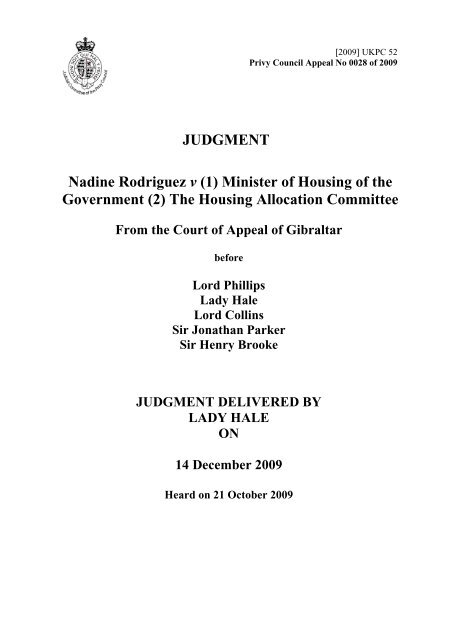
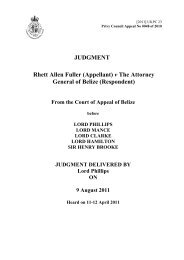
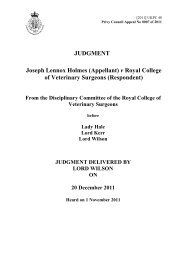
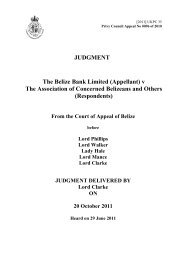
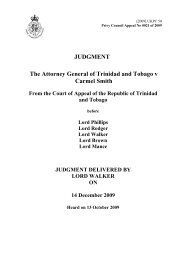
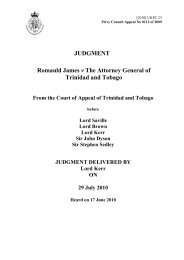
![[2011] UKPC 10 - Judicial Committee of the Privy Council](https://img.yumpu.com/23644185/1/184x260/2011-ukpc-10-judicial-committee-of-the-privy-council.jpg?quality=85)
